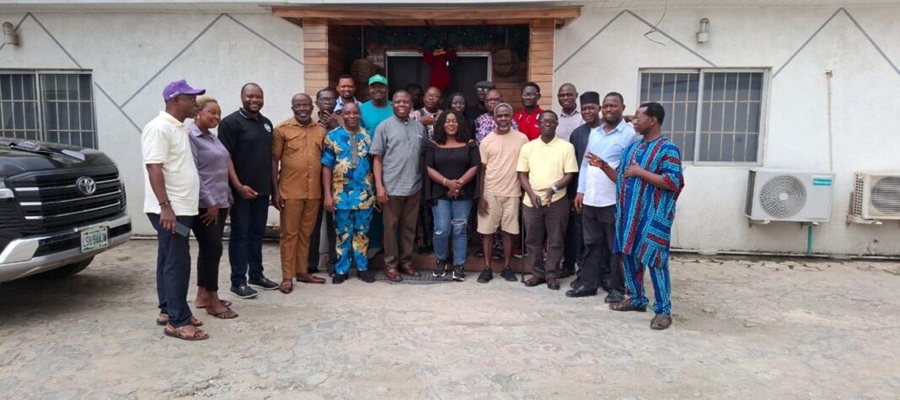Broadcasting
World Environment Day 2024: AstraZeneca Highlights Commitment to Tackling Climate Change and Biodiversity Loss

In recognition of World Environment Day 2024 under the theme; ‘land restoration, desertification, and drought resilience’, AstraZeneca has highlighted its commitment to tackling climate change and biodiversity loss—two of the most pressing challenges of our time.

Aligned with the UN Environment Programme’s call to action for #GenerationRestoration focused on three priorities: reviving lands, ending desertification, and securing water, AstraZeneca through the AZ Forest reforestation programme and comprehensive water stewardship initiatives is enabling the interconnectedness of environmental health and human health, fostering resilience against climate change, improving air and water quality, and supporting biodiversity.
By 2030, AstraZeneca aims to plant and maintain 200 million trees across six continents through AZ Forest. This global project, which focuses on agroforestry, regraded agricultural land, and natural forest restoration, collaborates with local people and landscape restoration specialists, and is made to optimize the co-benefits of reforestation, which include lowering the risk of natural disasters, promoting sustainable livelihoods, strengthening climate resilience, and safeguarding biodiversity.
Deepak Arora, Country President, African Cluster at AstraZeneca, said, “At AstraZeneca, we recognise that the well-being of our planet is fundamentally connected to the health of its inhabitants.
“Our dedication to environmental sustainability in Africa, exemplified by projects like AZ Forest and our comprehensive water stewardship efforts, goes beyond tree planting and water conservation. It’s about nurturing resilience and enhancing the quality of life of the communities we serve.
“This World Environment Day, we are proud to stand alongside local partners and communities to protect our environment and ensure a healthier, more sustainable future for everyone.”
In Ghana’s Atebubu and Sene West districts, AstraZeneca is partnering with the Circular Bioeconomy Alliance and New Generation Plantation Technical Assistance to restore over 8,000 hectares of degraded land. By the end of 2023, 23 communities were engaged, and over 3.8 million trees were planted. This community-led project aims to plant 4.7 million trees and includes environmental DNA (eDNA) analysis to monitor freshwater biodiversity impacts.
Towards protecting the water basins, AstraZeneca is committed to enhancing water quality, promoting efficient use, and safeguarding ecosystems. We are working with local communities to identify shared challenges such as water scarcity, pollution, and habitat loss.
Through these collective efforts, we aim to enhance water security and resilience against climate-related impacts. So far, we have implemented rainwater harvesting systems and constructed wetlands to improve water quality and availability for local communities.
These efforts are part of our broader commitment as members of the Alliance for Water Stewardship (AWS), where we actively participate in advancing good water stewardship practices across our sites.
We are working closely with our industry peers to craft a pioneering Roadmap to Nature Positive tailored specifically for the pharmaceutical sector. This roadmap is designed to expedite business involvement and initiatives aimed at achieving the overarching societal objective of nature positivity. By providing sector-specific guidance, our collective efforts seek to drive tangible progress and ensure a sustainable future for both the pharmaceutical industry and the environment.
AstraZeneca’s initiatives in global reforestation and water stewardship reflect our commitment to environmental sustainability. Through these collaborative efforts, we are actively contributing to the preservation of our planet. By nurturing partnerships and leveraging innovative solutions, we are forging a path towards a greener, healthier future for generations to come. Let us continue to unite in our mission to restore and safeguard our environment, ensuring a brighter tomorrow for all.
Broadcasting
Tim Akano Recounts 20-Year Growth, Media Support at NITRA End-of-Year Meet

Mr. Tim Akano, New Horizons Chief Executive Officer, took centre stage at the Nigerian Information Technology Reporters’ Association (NITRA) annual end-of-year meeting on Thursday, December 18, 2025, recounting the company’s remarkable growth and reaffirming free IT training for journalists.

Tim Akano, New Horizons Chief Executive Officer, in a group photograph with NITRA Members
Speaking directly to IT media members at the company’s training facility in Lagos, Akano acknowledged the critical role journalists played in supporting New Horizons during its formative years two decades ago.
He detailed how the firm evolved from a handful of staff to one of Africa’s leading ICT skills training organisations, now employing about 500 staff across multiple training centres nationwide.
Akano Spotlights Youth Training, University Partnerships
Akano highlighted that New Horizons has trained over 500,000 youths, particularly tertiary institution students, equipping them with practical IT skills essential for Nigeria’s digital economy.
He announced recent partnerships with universities, including a new agreement with Afe Babalola University, to scale hands-on training programmes for students.
“This growth would not have been possible without the media’s support in documenting our journey,” Akano stated, pledging continued free IT skills training for media members to remain competitive in the evolving digital landscape.
Reciprocal Support Defines Long-Standing Partnership
The venue hosting the NITRA meeting underscored Akano’s generosity; NITRA Secretary Chidiebere Nwankwo secured the free facility after contacting him—a gesture consistent with New Horizons hosting multiple association events and training IT journalists since its inception 20 years ago.
Participants shared personal testimonies of Akano’s support, including veteran journalist Aaron Ukodie, whose daughter—an Accounting graduate from the University of Johannesburg—received NYSC placement and IT scholarship at New Horizons.
The Guardian’s Yemi Adeyemi recounted Akano accommodating his editor’s child for mandatory IT training after other firms declined.
Members praised Akano’s commitment to human capital development as evidence of deep appreciation for the media community that chronicled New Horizons’ success over two decades.
Broadcasting
NIMC rolls out Pre-Enrolment Portal for seamless NIN registration

National Identity Management Commission (NIMC) has launched the NIMC Pre-Enrolment Portal to revolutionise the National Identification Number (NIN) enrolment process, enabling applicants within Nigeria and in the Diaspora to capture biodata online prior to biometric verification at enrolment centres.

NIMC
Accessible via penrol.nimc.gov.ng, the platform allows users to fill enrolment forms, schedule appointments, upload supporting documents securely, and manage personal details directly, thereby slashing congestion, minimising wait times, boosting data accuracy and enhancing overall service efficiency at centres nationwide.
NIMC Director-General and CEO, Engr. (Dr) Abisoye Coker-Odusote, spearheaded the initiative as part of the Commission’s technology-driven strategy to fortify institutional performance, aligning with President Bola Ahmed Tinubu’s Renewed Hope Agenda that emphasises digital transformation, efficient public service delivery and inclusive national development.
Dr Kayode Adegoke, Head of Corporate Communications, highlighted key benefits including simplified biodata handling, confidential data protection through robust security measures, reduced physical centre visits and heightened operational effectiveness, urging all prospective enrollees to adopt the portal for a faster, citizen-friendly experience.[conversation_history]
The move underscores NIMC’s mandate under the NIMC Act No. 23 of 2007 to manage the National Identity Database, issue NINs and foster a reliable digital identity ecosystem vital for national planning, with users advised to complete pre-enrolment online before heading to selected centres for biometrics.
Broadcasting
MultiChoice Talent Factory Calls for Entries Into Fully Funded Film Training Programme

MultiChoice Talent Factory (MTF), a Pan-African film and television training institution, has announced the opening of applications for its 2026 intake.

MultiChoice
The fully funded programme is open to African graduates aspiring to become directors, filmmakers, scriptwriters, producers and storytellers.
According to MultiChoice, the nine-month accredited curriculum combines online learning with intensive in-person training, and is designed to balance theoretical knowledge with practical immersion.
MTF academies are located in Kenya, Nigeria and Zambia, and serve aspiring filmmakers from 14 African countries. Since its inception in 2018, the initiative has trained 296 filmmakers, with graduates producing more than 42 movies aired on DStv, GOtv and Showmax platforms.
Organisers said alumni of the programme have gone on to establish over 50 production companies, while many continue to work within the MultiChoice ecosystem.
Graduates have also won accolades at the Africa Magic Viewers’ Choice Awards, Kalasha Awards, Uganda Film Festival and Women in Film Awards.
Applications for the 2026 intake close on Feb. 27, 2026. Interested candidates can visit https://apo-opa.co/3XW53oE for programme requirements.

 Telecom3 days ago
Telecom3 days agoGoogle Finally Allows Users to Change Gmail Address, Keeps Data and Services Intact

 News3 days ago
News3 days agoInsomniaQ Spotlights African Creativity in Lagos

 General News3 days ago
General News3 days agoT2 Backs Youth Excellence as NCBC Wins Bosun Tijani Foundation Basketball Tournament

 E-Financial2 days ago
E-Financial2 days agoNigeria’s N58.18trn Budget and Rising Cost of Deficit Governance

 Telecom2 days ago
Telecom2 days agoNnaemeka Ani – The Architect of ‘Code and Courage’

 Telecom2 days ago
Telecom2 days agoMTN Nigeria Appreciates Partners, Customers at Lagos Prestige Experience

 Telecom21 hours ago
Telecom21 hours agoNCC Grants 45 Days for Telecoms Firms to Fix Unapproved Shareholding Changes

 Telecom21 hours ago
Telecom21 hours agoT2 Faces NCC Probe in Benue Over Major Service Outage in 9 LGAs






















